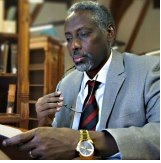16 Apr 2013
Editor’s Note: Dr. Abdurahman M. “Baadiyow” is a well-known Somali activist, educator, politician, and one of the senior leaders of Al Islah Islamic organization. Dr. Baadiyow was one of the top candidates of the 2012 Somali presidential election. WDN had an insightful and multi-faced interview with Dr. Baadiyow on the current situation in Somalia, both the challenges and the prospects. Abdelkarim A. Hassan has conducted this interview for WDN.
_______________
_______________
WardheerNews: Dr. Baadiyow, could you share with WardheerNews readers about your background?
Dr. Baadiyow: In the name of Allah, the Merciful and the Beneficent. Let me first thank you for posting these questions for the interest of the public. To answer your question briefly, I am a former military officer (1971-1986) and hold a PhD in Islamic studies from McGill University, Canada. I have returned to Somalia in 1992 in the capacity of regional director of Mercy-USA for Aid and Development. I am also one of the founders of Mogadishu University and its current chairman of the Board of Trustees. I am also a member of Islah Movement and a member of its Shura Council since 1995, and its vice-chairman in (1999-2008). Currently, I am responsible for the bureau of reconciliation and political activism. Finally, I was a presidential candidate in the 2012 race.
WDN: You were one of the founders of Mogadishu University. Can you tell us the challenges and successes thus far achieved by Mogadishu University?
Dr. Baadiyow: Mogadishu University is one of the major achievements of Somali initiatives during the civil war. Establishing internationally recognized university in the midst of the civil war in Mogadishu is obviously extremely challenging. The very idea was innovative, visionary and ambitious. The biggest challenge was convincing the community that a university could be established by private citizens since the field of higher education was considered to be in the domain of the state. The second challenge was to persuade students who used to get free education to pay fees without which the project cannot sustain itself. The third challenge was adopting a competitive curriculum and hiring qualified faculty members in order to gain international recognition. However, all of these challenges have been dealt with successfully. MU boasts to have given admissions to more than 10,000 Somali students in its seven undergraduate faculties and postgraduate programs. Its graduates are the backbone of the young Somali scholars and professionals today.
WDN: You ran for the office of Somalia’s president in last year’s presidential election. What have you learned from that experience?
Dr. Baadiyow: After running in the presidential election of 2012, I am relieved and believe that I have done my part in attempting to provide leadership to my people. Indeed, running for a presidential position was a great opportunity and experience. I have learned a lot about emerging trends of Somalia’s political culture and interacted with many political elites. I have observed two important trends: the weakening role of political clannism and nationalism, and the growing role of the pragmatic individualistic motives of “what’s in It for me”. Lessons learned will be considered and counted in the future political engagements. Indeed, it’s my deep conviction that Allah gives leadership to whom He wants and stripes leadership from whom He wants.Continued


No comments:
Post a Comment